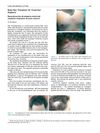 32 citations,
September 2015 in “Dermatology”
32 citations,
September 2015 in “Dermatology” Certain leukemia drugs can cause severe skin reactions that may require stopping treatment.
 31 citations,
April 2019 in “Experimental and Therapeutic Medicine”
31 citations,
April 2019 in “Experimental and Therapeutic Medicine” β-blockers can cause skin problems like psoriasis and vitiligo, and doctors should tell patients about these risks.
 27 citations,
January 2015 in “Current problems in dermatology”
27 citations,
January 2015 in “Current problems in dermatology” The document concludes that primary scarring alopecias cause permanent hair loss, have unpredictable outcomes, and lack definitive treatments, requiring personalized care.
 27 citations,
May 2007 in “Archives of dermatological research”
27 citations,
May 2007 in “Archives of dermatological research” Diphencyprone treatment increases CD8 lymphocytes in the scalp, which is associated with hair regrowth in alopecia areata patients.
 25 citations,
July 2020 in “Journal of cosmetic dermatology”
25 citations,
July 2020 in “Journal of cosmetic dermatology” Deoxycholic acid is effective for reducing chin fat but can cause side effects and serious complications, so careful patient evaluation is needed.
 23 citations,
April 2021 in “Journal of Clinical Medicine”
23 citations,
April 2021 in “Journal of Clinical Medicine” Frontal Fibrosing Alopecia's cause is unclear, affects mainly postmenopausal women, and current treatments focus on stopping hair loss rather than regrowth.
 23 citations,
March 2001 in “Clinics in dermatology”
23 citations,
March 2001 in “Clinics in dermatology” Alopecia areata involves immune response and gene changes affecting hair loss.
 22 citations,
October 2020 in “Anais Brasileiros de Dermatologia”
22 citations,
October 2020 in “Anais Brasileiros de Dermatologia” The Brazilian Society of Dermatology agrees that oral isotretinoin is effective for acne and other skin conditions, and it's safe when monitored, but more research is needed on dosing and duration.
 20 citations,
June 2010 in “Genes and Immunity”
20 citations,
June 2010 in “Genes and Immunity” Blood tests can help understand the genetic differences in people with alopecia areata, including how severe it is and if it's inherited.
 20 citations,
July 2008 in “Dermatologic Therapy”
20 citations,
July 2008 in “Dermatologic Therapy” The document says that treating the root cause of hair follicle damage is crucial to prevent permanent hair loss, and treatment options vary.
 19 citations,
January 2015 in “Current problems in dermatology”
19 citations,
January 2015 in “Current problems in dermatology” Ultraviolet rays damage hair, smoking may cause hair loss, and good nutrition is important for hair health, but genetics mainly decide hair thickness.
 19 citations,
June 2009 in “Seminars in cutaneous medicine and surgery”
19 citations,
June 2009 in “Seminars in cutaneous medicine and surgery” Proper education can prevent traction alopecia in women of color.
 17 citations,
October 2017 in “Journal of Cutaneous Medicine and Surgery”
17 citations,
October 2017 in “Journal of Cutaneous Medicine and Surgery” No treatment has been proven to effectively stop hair loss or regrow hair in Frontal Fibrosing Alopecia, and more research is needed.
 16 citations,
January 2013 in “Indian Journal of Dermatology, Venereology and Leprology”
16 citations,
January 2013 in “Indian Journal of Dermatology, Venereology and Leprology” New treatments and early diagnosis methods for permanent hair loss due to scar tissue are important for managing its psychological effects.
 12 citations,
June 2020 in “Journal of The American Academy of Dermatology”
12 citations,
June 2020 in “Journal of The American Academy of Dermatology” Platelet-rich plasma is tolerable for lichen planopilaris and doesn't worsen the condition, but its effectiveness is unclear.
 11 citations,
August 2016 in “Journal of dermatological treatment”
11 citations,
August 2016 in “Journal of dermatological treatment” Tip cryotherapy effectively treats idiopathic guttate hypomelanosis with minimal side effects.
 11 citations,
May 2009 in “Actas Dermo-Sifiliográficas”
11 citations,
May 2009 in “Actas Dermo-Sifiliográficas” Some treatments can help hair regrowth in alopecia areata, but none offer a cure, and effectiveness varies.
 11 citations,
March 2007 in “Digestive Diseases and Sciences”
11 citations,
March 2007 in “Digestive Diseases and Sciences” The conditions alopecia areata, primary sclerosing cholangitis, and ulcerative colitis may be linked by shared autoimmune and cell death mechanisms.
 9 citations,
September 2006 in “Clinical Pediatrics”
9 citations,
September 2006 in “Clinical Pediatrics” Pediatricians should treat some hair loss types in children and refer others to a dermatologist.
 9 citations,
May 2005 in “Expert Review of Clinical Immunology”
9 citations,
May 2005 in “Expert Review of Clinical Immunology” Blocking interferon-gamma might help treat various autoimmune diseases.
 8 citations,
January 2019 in “Acta dermato-venereologica”
8 citations,
January 2019 in “Acta dermato-venereologica” Some children with localized scleroderma are rarely resistant to methotrexate, and no common profile for resistance was found.
 7 citations,
January 2015 in “Current problems in dermatology”
7 citations,
January 2015 in “Current problems in dermatology” Hair loss can be caused by stress, infections, drugs, and various diseases, with treatment depending on accurate diagnosis.
 6 citations,
January 2019 in “Medical Hypotheses”
6 citations,
January 2019 in “Medical Hypotheses” Frontal Fibrosing Alopecia might be an autoimmune disease.
 5 citations,
January 2018 in “Annals of Dermatology”
5 citations,
January 2018 in “Annals of Dermatology” A 308 nm excimer laser successfully treated a boy with a rare skin condition after about a year of weekly sessions.
 5 citations,
March 2012 in “Actas Dermo-Sifiliográficas”
5 citations,
March 2012 in “Actas Dermo-Sifiliográficas” Body-hair transplant successfully improved scarred areas and frontal hair density without visible chest scarring.
 5 citations,
September 2002 in “Archives of Dermatology”
5 citations,
September 2002 in “Archives of Dermatology” Dermatologists diagnose and manage melanoma more effectively than general practitioners.
 4 citations,
March 2009 in “British Journal of Dermatology”
4 citations,
March 2009 in “British Journal of Dermatology” The conference highlighted new dermatological treatments and emphasized early intervention and addressing conditions lacking evidence-based treatments.
 3 citations,
November 2020 in “Clinical, Cosmetic and Investigational Dermatology”
3 citations,
November 2020 in “Clinical, Cosmetic and Investigational Dermatology” Early diagnosis and combination therapy, especially with finasteride and dutasteride, are key to managing Frontal Fibrosing Alopecia effectively.

New treatments for vitiligo may focus on protecting melanocyte stem cells from stress and targeting specific pathways involved in the condition.
 3 citations,
July 2017 in “Elsevier eBooks”
3 citations,
July 2017 in “Elsevier eBooks” Skin reactions are a common reason for emergency visits due to drug allergies, with some severe cases needing intensive care.






























